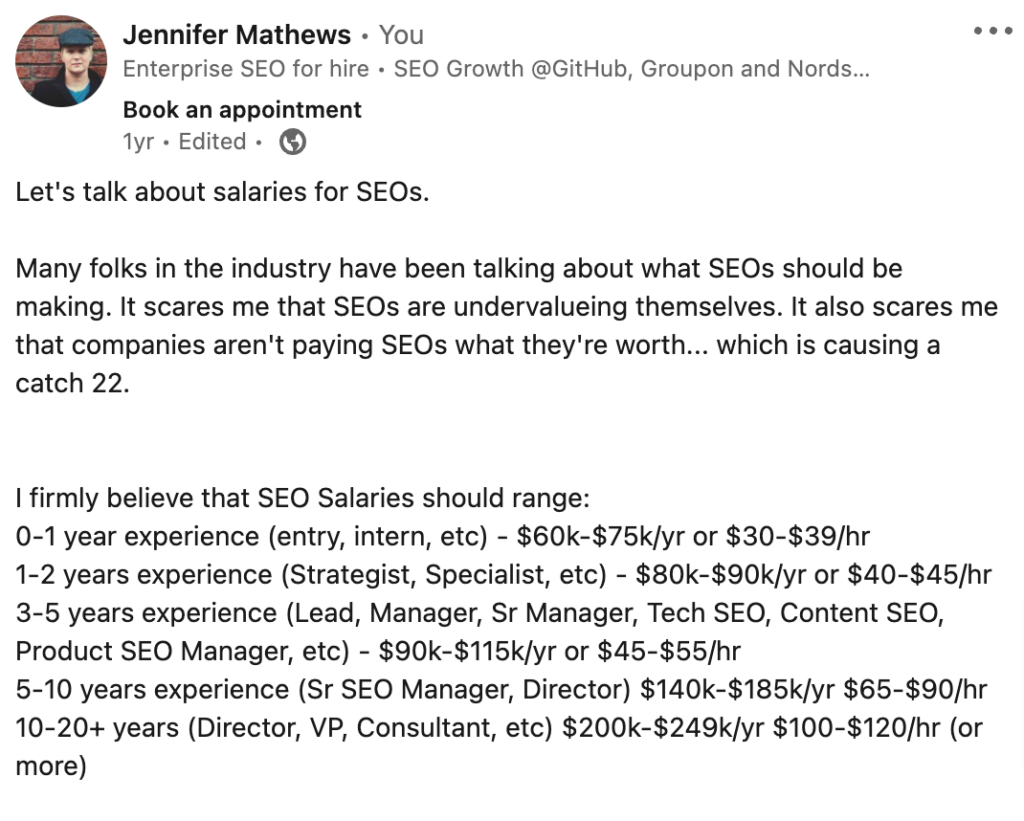In the dynamic realm of Search Engine Optimization (SEO) careers, the recent post regarding the SEO career on MasterSEO.io has ignited fervent discussions around the necessity of degrees in this field. As the controversy simmers, our exploration today ventures into a parallel, yet equally intriguing, facet of the SEO landscape: the intricacies and debates surrounding SEO salaries. Little did I foresee the resonating responses when I broached this topic on LinkedIn. Join me as we navigate the tumultuous journey of unraveling the mysteries and controversies that shroud the question: Is SEO a high-paying job?
The Catch-22 of valuation
In the digital marketing web, where algorithms and keywords dance, I voiced my concern on LinkedIn. SEO professionals seem caught in a disconcerting web where self-valuation meets corporate undervaluation. This perplexing dance creates a Catch-22 situation, where professionals undersell their prowess, and companies fail to grasp the true worth of their SEO wizards. A conundrum, indeed!
Crafting a Salary spectrum: A blueprint for fair compensation
I proffered a structured salary range based on experience, role, and company type to navigate this nebulous realm. A meticulous attempt to guide both professionals and employers in calibrating fair compensation. For the greenhorns with 0-1 year of experience, I proposed a range of $60k-$75k/yr or $30-$39/hr, while seasoned veterans with 10-20+ years could command $200k-$249k/yr or $100-$120/hr. The backdrop of the role, company size, and additional perks like stock options and benefits played starring roles in this compensation drama.

Simply put, salaries in SEO should reflect company size, role type, and industry context, be it startup, medium, Fortune 500, or agency versus in-house.
Examples:
- An SEO Manager with three years in a medium-sized, non-publicly traded company: $90k/yr + stock and benefits = TC $110k/yr.
- SEO Manager with three years at a Fortune 500 company: $115k/yr + stock, bonus, benefits = TC $140k/yr.
Background matters:
- Freelance SEO with four years: Lower range based on title, company, and responsibilities.
- Content Manager at Facebook, Google, or Amazon for three years, plus two years as an SEO at an agency transitioning to a medium-sized company: Higher range + bonus, benefits.
Geography is intentionally omitted. Living in Nepal and now on an island, I believe pay should not be affected by location; skills and experience hold value universally.
Addressing the controversy: a clash of perspectives
As the LinkedIn post gained traction, one particular comment ignited a spirited debate. A Freelance SEO, Cassidy Rush, questioned whether working at tech titans like Facebook, Google, or Amazon should equate to higher pay. This is a valid concern, prompting me to clarify that it’s not about the brand but the diverse experience these giants offer. The ability to navigate the startup whirlwind and manage the corporate labyrinth warrants recognition, irrespective of the logo on the business card.
Experience matters: beyond brand names
The heart of the matter lies in the conviction that experience, irrespective of the company’s fame, should be a compensable factor. Having traversed the diverse landscapes of startups and corporate behemoths, I’ve gleaned insights that transcend the confines of brand names. The years spent crafting SEO strategies at Nordstrom, Groupon, and Microsoft contributed to an adaptable and resilient skill set.
This LinkedIn post was not merely a monologue; it evolved into a symphony of diverse voices. Jason Wilson, an SEO & PPC Growth Engine, chimed in, appreciating the illumination cast upon this oft-shrouded topic. Andy Halko, a Strategic Consulting AI Leader, introduced the intriguing concept of paying based on outcomes rather than mere experience. A dialogue that merits exploration in future discussions.
The shout out: Mark Preston’s insightful take
In the midst of this virtual dialogue, a beacon of wisdom emerged—Mark Preston’s blog post. His exploration of SEO salaries resonates with the ongoing discourse, adding layers of insight to our collective understanding. For those hungry for more perspectives, his blog post is a compass guiding us through the labyrinth of SEO compensation intricacies. Read it here.
As we navigate the meandering river of SEO salaries, the question lingers:
Is the allure of high pay justified, or are expectations often unrealistic?
The debate rages on, each comment adding a stroke to this vibrant canvas of perspectives. In this dynamic industry, finding a harmonious balance between fair compensation and acknowledging the kaleidoscope of experiences is paramount. I invite you to share your thoughts, engage in this crucial conversation, and collectively forge a path toward a fair and equitable SEO future.

Jenn Mathews, known as the SEOGoddess, is an esteemed expert in Enterprise SEO with over 20 years of experience. She has held key positions at organizations like GitHub, Groupon, and Nordstrom, where she has showcased her expertise in technical SEO, strategic development, and championing SEO within large enterprises. Jenn now shares her knowledge through mentoring, writing for Search Engine Journal (SEJ), Search Engine Land (SEL) and speaking engagements.




